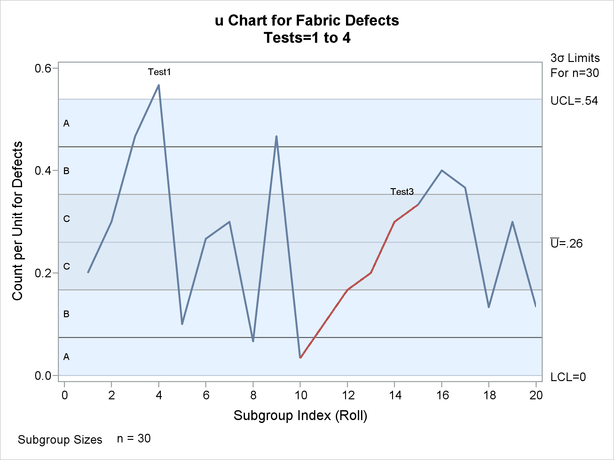UCHART Statement: SHEWHART Procedure
Example 15.31 Applying Tests for Special Causes
[See SHWUEX1 in the SAS/QC Sample Library]This example illustrates how you can apply tests for special causes to make  charts more sensitive to special causes of variation.
charts more sensitive to special causes of variation.
A textile company inspects rolls of fabric for defects. The rolls are one meter wide and 30 meters long. The following statements create a SAS data set named Fabric3, which contains the number of fabric defects for 20 rolls of fabric:
data Fabric3; input Roll Defects @@; datalines; 1 6 2 9 3 14 4 17 5 3 6 8 7 9 8 2 9 14 10 1 11 3 12 5 13 6 14 9 15 10 16 12 17 11 18 4 19 9 20 4 ;
The following statements create a  chart and tabulate the information on the chart. The chart and tables are shown in Output 15.31.1 and Output 15.31.2.
chart and tabulate the information on the chart. The chart and tables are shown in Output 15.31.1 and Output 15.31.2.
ods graphics on;
title1 'u Chart for Fabric Defects';
title2 'Tests=1 to 4';
proc shewhart data=Fabric3;
uchart Defects*Roll / subgroupn = 30
tests = 1 to 4
odstitle = title
odstitle2 = title2
tabletests
zonelabels;
run;
The TESTS= option requests Tests 1, 2, 3, and 4, which are described in Tests for Special Causes: SHEWHART Procedure. Only Tests 1, 2, 3, and 4 are recommended for  charts. The ZONELABELS option requests the zone lines, which are used to define the tests, and displays labels for the zones. The TABLETESTS option requests a table of the values of
charts. The ZONELABELS option requests the zone lines, which are used to define the tests, and displays labels for the zones. The TABLETESTS option requests a table of the values of  and the control limits, together with a column indicating the subgroups at which the tests are positive.
and the control limits, together with a column indicating the subgroups at which the tests are positive.
Output 15.31.1 and Output 15.31.2 indicate that Test 1 is positive for Roll 4 and Test 3 is positive at Roll 15.
 Chart
Chart

 Chart
Chart
| u Chart for Fabric Defects |
| Tests=1 to 4 |
| u Chart Summary for Defects | |||||
|---|---|---|---|---|---|
| Roll | Subgroup Sample Size |
3 Sigma Limits with n=30 for Count per Unit |
Special Tests Signaled |
||
| Lower Limit |
Subgroup Count per Unit |
Upper Limit |
|||
| 1 | 30.0000 | 0 | 0.20000000 | 0.53928480 | |
| 2 | 30.0000 | 0 | 0.30000000 | 0.53928480 | |
| 3 | 30.0000 | 0 | 0.46666667 | 0.53928480 | |
| 4 | 30.0000 | 0 | 0.56666667 | 0.53928480 | 1 |
| 5 | 30.0000 | 0 | 0.10000000 | 0.53928480 | |
| 6 | 30.0000 | 0 | 0.26666667 | 0.53928480 | |
| 7 | 30.0000 | 0 | 0.30000000 | 0.53928480 | |
| 8 | 30.0000 | 0 | 0.06666667 | 0.53928480 | |
| 9 | 30.0000 | 0 | 0.46666667 | 0.53928480 | |
| 10 | 30.0000 | 0 | 0.03333333 | 0.53928480 | |
| 11 | 30.0000 | 0 | 0.10000000 | 0.53928480 | |
| 12 | 30.0000 | 0 | 0.16666667 | 0.53928480 | |
| 13 | 30.0000 | 0 | 0.20000000 | 0.53928480 | |
| 14 | 30.0000 | 0 | 0.30000000 | 0.53928480 | |
| 15 | 30.0000 | 0 | 0.33333333 | 0.53928480 | 3 |
| 16 | 30.0000 | 0 | 0.40000000 | 0.53928480 | |
| 17 | 30.0000 | 0 | 0.36666667 | 0.53928480 | |
| 18 | 30.0000 | 0 | 0.13333333 | 0.53928480 | |
| 19 | 30.0000 | 0 | 0.30000000 | 0.53928480 | |
| 20 | 30.0000 | 0 | 0.13333333 | 0.53928480 | |
